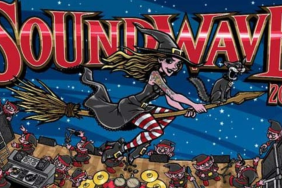Fairfax Media have published an investigation into whether popular youth radio station Triple J has had a homogenising effect on Australian contemporary music, featuring interviews with artists who’ve run afoul of the station’s influence and some who’ve changed their sound to suit Triple J.
“We did, to be honest, cater the songwriting to Triple J in the beginning,” an unidentified 27-year-old Melbourne musician confesses to Fairfax in the article. As writer Nick Clarke explains, the young artist decided to adjust his style in order to find better success with his musical ventures.
“It definitely affects bands Australia-wide,” the artist says. “I feel like you shouldn’t have any sort of worry or any other thought except, ‘I’m going to make exactly what I want to make’.” But as the artist reveals, many musicians are plagued by anxiety over whether Triple J will like their music.
“It really is shit, it really is frustrating. I talk about this with nearly every musician friend…that there’s no other station that’s up there with Triple J,” he concludes. The station’s influence, with an average weekly reach of 1.8 million listeners Australia-wide, can even have a silencing effect on some.
“Once this got published our publicist rang up and screamed, ‘What the f-ck have you done, you’ll never get played on Triple J again!'” says one respected 26-year-old Sydney musician of the fallout following comments she made suggesting that a certain “sound” was needed to be on Triple J.
“I was like, ‘What do you mean? I didn’t even say anything bad’ and then our manager was calling up, and then [our people] made me write an apology…that is f-cking ridiculous. It shouldn’t be this dictatorial thing where you’re not even allowed to criticise Triple J because that’s bullshit,” she says.
“No branch of the government is like that at all. We should be able to discuss this more…there’s this sense that they’re above criticism,” she adds. But Kris Schroeder of Melbourne band The Basics, who himself has been critical of the station and music director Richard Kingsmill, disagrees.
“We were pissed off that they were neglecting us when we were young and we were a lot more headstrong or whatever,” Schroeder says. “And it’s like, well…you’ve just gotta deal with it.” Schroeder likens the influence of the station to that of a powerful stock market insider, saying:
“Basically if you put it in a metaphor of the stockmarket, Triple J is the insider that says ‘Buy these shares’ and everybody rushes to buy them. There’s stuff that just falls by the wayside consequentially.
“It’s about alternatives and there aren’t many alternatives in this business because most people prefer to be followers rather than leaders.”
Schroeder said that the music industry was to blame for homogenisation. “It’s just a shame that the industry is so obsessed with the decisions that a couple of people make…Maybe if the industry wasn’t so f-cking lazy and so narrow-minded…the industry itself needs a shake-up,” he says.
Triple J insiders also disagree with the Sydney musician’s assessment, with station manager Chris Scaddan saying that editorial decisions made about the musical direction of the station can sometimes lead to frustration in artists receiving infrequent rotation. He says:
“People can get frustrated with Triple J if we’re not adding their acts to high rotation or playing their songs and that goes with the territory. We can’t play everything though; we’ve got to make editorial decisions and we’re open with artists about that.
“But the thought that we turn away artists if they criticise us isn’t true. We are always open to discussion and there are countless opinions out there about Triple J.”
Meanwhile, Triple J Unearthed music director Dave Ruby Howe says that bands attempting to capitalise on what they see as popular musical trends on Triple J won’t get far, saying:
“Naturally there are some particular sounds and influences at the moment that you hear a bit more of like the Flume effect that’s inspired a lot of new electronic producers as well as the Queensland garage scene championed by bands like Bleeding Knees and Dune Rats.
“Taking inspiration and influence from other artists makes sense, but when music becomes forced and inauthentic it’s pretty easy to see through it.”
“Unearthed also allows us to see how fast things move and sounds evolve currently, so imitating a certain sound that could soon be usurped feels like a fruitless pursuit and I’d encourage any upcoming artist to continue developing their own style.”
The debate on the homogenising effects of Triple J has continued to rage on social media. It’s important to note that the station’s reliance on government funding gives the station a mandate to play at least 25 percent Australian music and unearth new Australian acts, making prioritising artists to which the station’s 18-to-24 audience is responding favourably, essential to its survival.
Then there are those like 27-year-old rapper Illy, who credits the station with kickstarting his career and indeed the Australian hip-hop scene itself. “I don’t know if I’d ever be able to have a music career if it wasn’t for the station and their support of grassroots Australian music,” he says.












